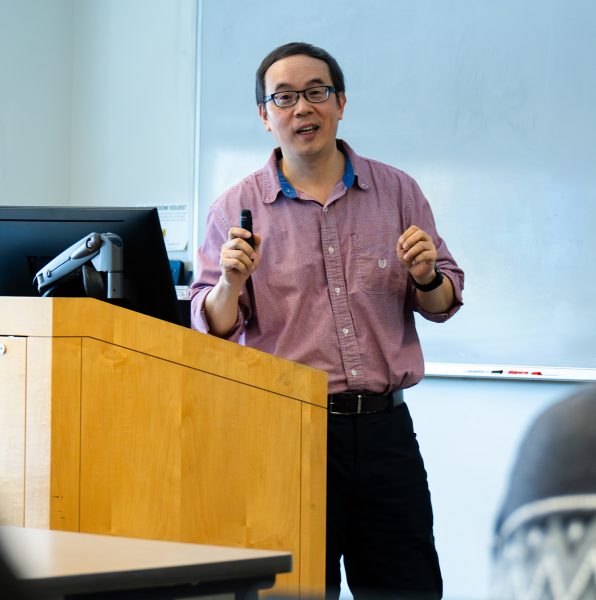
The College of Computing is pleased to announce that Yu Cai, professor in the Department of Applied Computing, is the college’s new associate dean effective August 1, 2024. As associate dean, Cai will provide oversight and leadership with respect to college research and academics.
“Yu has demonstrated expertise in both areas, making him ideally situated for this new combined associate dean role,” says Dennis Livesay, Dave House Dean of Computing.
“My priority will be to assist the dean in leading our college through the constantly evolving field of computing to ensure we fulfill our mission to be the premier provider of computing talent and innovation to Michigan and the Great Lakes region,” says Cai. “I am committed to creating and maintaining an environment that is welcoming, forward-thinking, and inclusive to all students, faculty, and staff members.”
A New Position Within the College of Computing
This reimagined associate dean position combines the former part-time associate dean roles focusing on curriculum and instruction and on research, led by Computer Science faculty members Charles Wallace and Dukka KC, respectively.
“I want to thank both Chuck and Dukka for their leadership,” says Livesay. “Our growth in research and academic impact has been substantial, and they should be proud of what they’ve accomplished.”
Cai says that his experience as a professor, program coordinator, and associate chair in the Department of Applied Computing has provided him with deep insights into academic administration, program coordination, curriculum development, and student engagement. In addition, his work as an ABET program evaluator has given him a comprehensive perspective on maintaining and enhancing academic standards.
“I have had many opportunities to work with Yu over the years and I have always been impressed by the quality of his work, especially his ability to bring together people from diverse backgrounds,” says Livesay.
“Yu is the principal investigator on a large number of capacity-building National Science Foundation (NSF) grants, and for many years he has successfully overseen the ABET accreditation process for the Computer Network and System Administration (CNSA) bachelor degree program,” adds Livesay. “I am excited to work with him even more closely as we continue to advance the College of Computing.”
Cai is also an active member of the Institute of Computing and Cybersystems (ICC) research center and director of the ICC’s Computing Education Center.
“Maintaining the close relationship between the College of Computing and the ICC is a major priority for us, and Yu is the perfect person to emphasize that,” says Livesay.
Pioneering Innovative Educational and Research Practices
As the associate dean, Cai will draw on his extensive background in cybersecurity, computer networks, and computing education. And his work as a consultant for industry partners and involvement in K-12 outreach activities has equipped him with a practical understanding of both industry and community needs.
Enhancing collaboration and securing large external grants is one of the College of Computing’s top priorities. As associate dean, Cai will also leverage his research expertise, which includes securing multi-million-dollar grants from organizations such as the NSF and the National Security Agency.
“We aspire to pioneer innovative educational and research practices to advance the transformational promise of computing in the service of society,” says Cai, who also plans to focus on building strong industry partnerships in his new position.
The associate dean’s initial priorities include providing leadership and insights on national trends, incorporating cutting-edge technologies like Artificial Intelligence to keep College of Computing curricula and research innovative, and establishing new degree programs and research initiatives to address the needs of the evolving computing industry.
Another important priority is collaboration with faculty, students, administrators, and other stakeholders to maintain rigorous, practical, and engaging curricula while leading continuous improvement efforts to enhance teaching quality and ensure accreditation compliance.
Cai will also play an important role in efforts to broaden participation in College of Computing programs and activities.
More About Yu Cai and the New Role
Cai says his leadership style is rooted in a philosophy that emphasizes service, vision, empowerment, collaboration, and adaptability to changing environments.
“I recognize this role as a position of service, and I am enthusiastic about the opportunity to serve,” he says. “For me, serving the community is not just a responsibility; it is a privilege that enables me to contribute positively and make a meaningful difference. My approach to this position is grounded in a deep sense of duty and a heartfelt desire to give back and uplift those around me.”
Cai began working at Michigan Tech in 2005. In addition to his previously mentioned professional activities he directs the NSF Scholarship for Service program. He advises the MTU RedTeam student organization and CyberHusky, a community outreach program that teaches middle and high school students basic cybersecurity knowledge.
In his leisure time, Cai enjoys gardening, downhill skiing, fishing, and hunting.
“Gardening teaches me the value of patience, as there is a time for everything and a season for every activity,” he says. “My other sporting hobbies allow me to relax and recharge, providing a much-needed balance to my professional responsibilities. These activities enrich my life, helping me stay grounded and focused.”